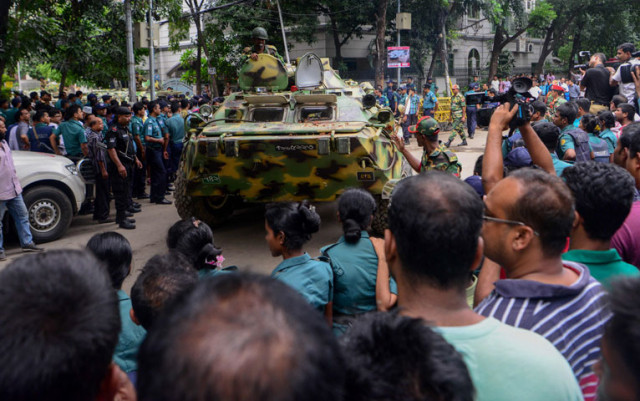The Dhaka attack
The lesson for all is that the IS can conduct sophisticated operations in locations supposedly secure

A Bangladeshi armoured military tank makes its way past journalists, onlookers and police near an upscale restaurant in Dhaka on July 2, 2016, following a bloody siege by armed attackers that began on July 1. PHOTO: AFP
The attack may be over but a host of questions arise — not least how a large group of heavily armed attackers were able to get inside a supposedly secure area. The damage they inflicted is beyond anything Bangladesh has seen for a generation, and marked a new phase for terrorism in the country which hitherto had been firm in its denial of an IS presence. The last three years have seen a steady rise in individual attacks on bloggers, secular civil society activists, academics and members of minority faiths and over 40 have died. Most of the attacks have been claimed by religious extremists and have been carried out with bladed weapons rather than guns or bombs. Whilst there will be soul-searching for Bangladesh, there is a salutary wake-up call for Pakistan, a country which hosts a range of foreign missions in closely guarded enclaves and which is also largely in denial as to an operational presence of the IS. There are now relatively few foreigners living ‘in the wild’ in Pakistan, and the majority of those that are, are married to Pakistani nationals and have been here for many years. A scattering of NGO consultants make up the rest of the resident foreign population. Tourists are principally confined to Gilgit-Baltistan but must also now be considered vulnerable. For Bangladesh, this will be a shock to the system like no other. An attack on this scale is unprecedented. The lesson for all is that the IS can conduct sophisticated operations in locations supposedly secure. We ignore that lesson at our own peril.
Published in The Express Tribune, July 3rd, 2016.
Like Opinion & Editorial on Facebook, follow @ETOpEd on Twitter to receive all updates on all our daily pieces.















COMMENTS
Comments are moderated and generally will be posted if they are on-topic and not abusive.
For more information, please see our Comments FAQ